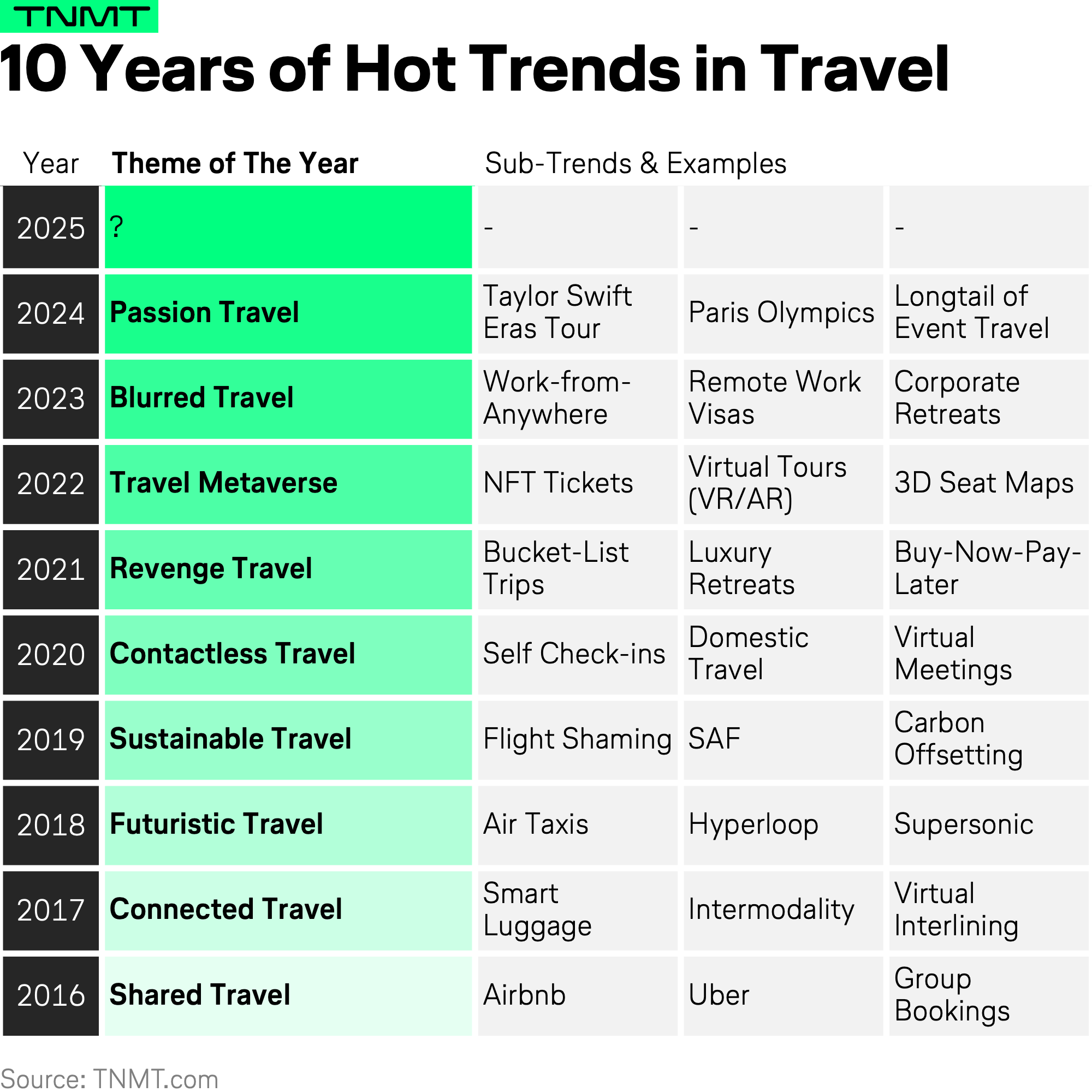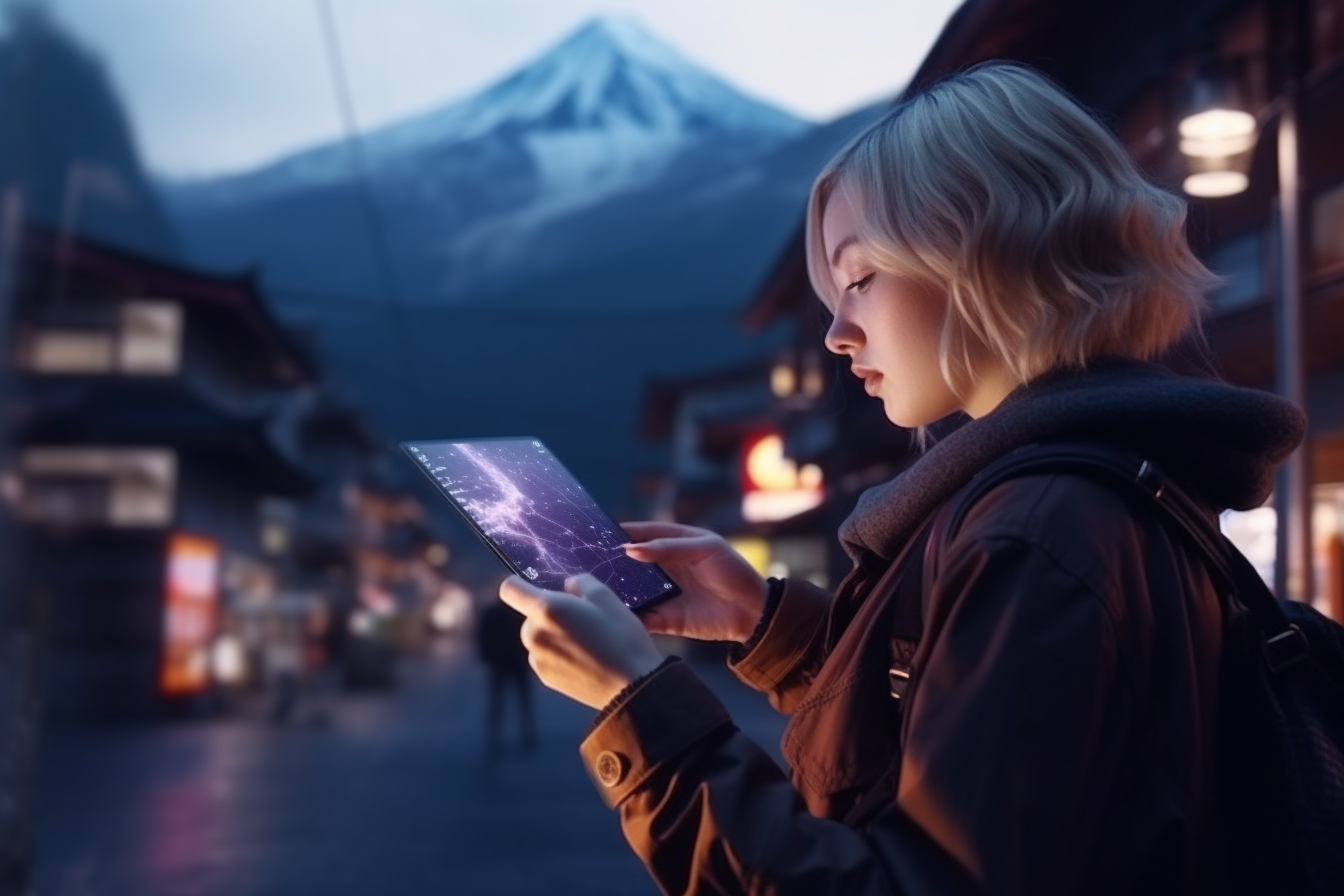Two weeks ago, we took a moment to reflect on the key themes that have defined the past ten years in Travel and Mobility Tech.
In case you missed our latest TNMT newsletter, here’s the overview again.

With this retrospective, we invited you to share your best-educated guesses on what will define travel in 2025.
The responses were incredible, and based on your insights, we’ve outlined four potential scenarios that could shape our industry this year.
Let’s explore each scenario one by one.
In the end, we’ll ask for your vote: Which theme do you think will dominate Travel and Mobility Tech in 2025 the most?
Scenario #1

Since the public launch of ChatGPT in late 2022, the buzz around Generative AI has been relentless.
- For the travel industry, AI has been hailed as a transformative force, promising to redefine how we search, plan, and book trips.
- In fact, many even declared AI the defining trend for travel in 2024.
But let’s face it—so far, the hype has outpaced the reality.
While we’ve seen an emergence of AI-powered travel startups, OTAs experimenting with AI-enhanced search functionalities, and even airlines integrating GenAI into customer chatbots, the tangible impact has been limited.
So, why do we believe 2025 will be the year the travel industry truly leapfrogs into the AI era?
Several market indicators suggest a real breakthrough is on the horizon.
1. A Shift Toward Mainstream Adoption
For starters, recent consumer surveys from Phocuswright reveal that half of all travelers expect to use Generative AI tools like ChatGPT for leisure travel planning within the next 12 months.
This shift is critical.
AI-powered itinerary planning is no longer confined to tech enthusiasts; it’s becoming a mainstream phenomenon.

2. The True Game-Changer: AI Agents
While tools like ChatGPT are widely used for inspiration and trip planning today, they have yet to impact bookings directly.
But that’s about to change.
Case in point:
- News broke late last year about OpenAI eagerly planning to launch its own “AI agent,” capable of autonomously performing computer-based tasks without human intervention.
- This includes navigating the web to search for travel deals and, most importantly, booking trips on behalf of users.
- In a live demo this week, ChatGPT’s digital assistant already showcased its ability to book restaurants on its own.
If travel applications become central to this next wave of “agentic systems,” the commercial implications could be enormous.
No wonder industry experts like McKinsey predict that Travel and Mobility will derive the most incremental value from Generative AI in the near term across all industry sectors.

We conclude that in 2025, the travel industry is poised for an unprecedented focus on AI.
With consumer adoption hitting critical mass and powerful new agent-driven applications emerging, AI will finally deliver on its promise to revolutionize travel planning and booking.
Scenario #2

Viral Travel highlights the transformative role of social media platforms in shaping how travelers discover, plan, and—more than ever—book their trips.
Now, you might argue that social media’s influence on the travel industry is nothing new.
Platforms like Instagram and TikTok have long shaped travel trends, dictating what’s “hot” and inspiring millions to pack their bags for the most “Instagrammable” destinations.
But despite its undeniable role in travel inspiration, social media’s commercial impact has, until now, been somewhat overlooked—viewed as a soft metric rather than a true revenue driver.
That’s about to change.
In 2025, social media’s impact on the travel industry will become undeniable, both as a driver of trends and, more importantly, as a direct booking channel.
Two powerful forces are converging to make this the year of Social Travel:
1. Social Media as the Go-To for Travel Inspiration
The scale at which travelers rely on social media and content creators, aka influencers, for inspiration has reached unprecedented dimensions.
- According to research from Expedia, reported by Beautiful Destinations, over two-thirds of all travelers now start their travel planning journey on platforms like Instagram, TikTok, and YouTube.
- This figure is more than double that of travelers who begin their inspiration phase on online booking sites.

To stay relevant, travel brands can no longer afford to view social media as an optional marketing channel.
Instead, it’s becoming the first—and often the most critical—touchpoint in the traveler’s decision-making process.
2. The Rise of Social Commerce in Travel
Additionally, social media is evolving from a source of inspiration to a revenue-generating channel, thanks to the rapid adoption of social commerce.
Here’s the proof:
- More than one-third of TikTok, Facebook, and Instagram users in the U.S. made direct purchases on these platforms in 2024.
- TikTok alone has seen the number of social buyers grow 10x in under four years.

While the ongoing debate around a potential TikTok ban in the U.S. might disrupt its growth in 2025, the trend itself isn’t platform-specific. If TikTok falters, social commerce will likely accelerate on platforms like Instagram, reflecting its broader momentum across the entire social media ecosystem.
And while social commerce today is dominated by fashion and beauty, travel is poised to be the next frontier.
Skift’s latest Megatrends Report highlights how creators are driving this shift.
- With their ability to seamlessly integrate travel experiences into engaging content, influencers are poised to transform how—and where—travelers book their trips.
- Imagine watching a breathtaking drone video of the Maldives on Instagram, followed by a single “Book Now” button that takes you directly to an all-inclusive package deal.
- That’s the next frontier of travel booking—and it’s closer than you think.
As TNMT readers, this should come as no surprise.
Since 2021, we’ve been analyzing the growing influence of social commerce, particularly in Asia’s travel ecosystem, where platforms like Mafengwo, WeChat, and Douyin have been trailblazers in merging inspiration with direct bookings.
2025 will mark the year Western markets catch up—and when social media cements its place as the next frontier for travel bookings.
Scenario #3

Scenario three shifts the spotlight to the evolving motivations of travelers, with a strong emphasis on the “transformational” experiences shaping travel intentions in 2025.
The term “transformational” is not new—it has been a buzzword in travel for years, often linked to the 2016–2017 boom around wellness travel. This movement was defined by luxury retreats, yoga immersions, and mindfulness programs designed to help travelers “let go,” rejuvenate mind and body, and inspire life changes.
But in 2025, the transformational travel movement is evolving beyond these initial wellness-focused roots. It is no longer just about relaxation or spiritual resets. Instead, travelers are pursuing journeys with tangible, often health-related benefits.
For example:
- Medical Travel is a form of transformational travel as it means traveling to other countries for medical procedures or treatments. This sector is projected to grow by double digits in 2025 as people seek affordable, high-quality care abroad.
- Sober Tourism is another growing “transformational” trend that focuses on destinations and activities that promote mental clarity and a lifestyle free from substances, especially alcohol.
- Psychedelic Tourism refers to travel trips exploring the mental health benefits of psychedelic-assisted therapies, which are gaining traction in regions where these treatments are legal—think ayahuasca-plant-based experiences in Costa Rica, for example.
- Longevity Travel is arguably the most hyped consumer theme in 2025. Kayak has coined it “Vitamin T,” with travelers prioritizing destinations based on their potential to improve life expectancy. From medical wellness programs and personalized nutrition guidance to fitness routines, these trips aim to enhance both physical and mental health. Hotel brands are even starting to specialize, with “longevity becoming the new luxury.”
The transformational travel trend underscores a broader cultural shift toward self-improvement, blending physical, mental, and emotional growth into the travel experience.

Like wellness travel before it, transformational travel may be a buzzword—but it’s one with substance.
- At its core lies the desire for travel to be more than just a physical journey.
- It’s about embarking on an emotional, maybe even spiritual, quest to reach a deeper understanding of oneself and the world.
As 2025 unfolds, transformational travel could redefine what it means to take a trip (pun intended).
Scenario #4

The fourth and final theme we want to explore is less optimistic than the previous three.
Yet, within challenges often lie untapped opportunities—a reality the travel industry must face head-on in 2025.
This theme, which Serial Entrepreneur Stephan Uhrenbacher referred to as “the elephant in the room,” centers on the growing notion of Restricted Travel.
What do we mean by “Restricted Travel”?
- The term captures a growing web of limitations impacting global mobility.
- These range from geopolitical tensions and wars to environmental constraints and over-tourism controls, all of which are increasingly redefining the boundaries of how, where, and when people travel.
1. The Geopolitical Elephant in the Room
We are living in an era of heightened geopolitical uncertainty.
From trade wars and the invasion of Ukraine to the war in the Middle East, one could argue that the world is more fragmented than it has been since the end of World War II.
Global tracking of armed conflicts reveals a record number of violent clashes worldwide, creating ripple effects across the tourism industry.

One concrete example is the no-fly zones over Russia, which have significantly extended travel times on Asian routes, complicating airline operations and frustrating travelers.
Similarly, international tourism to Israel plummeted to 80% below pre-pandemic levels in 2024 due to ongoing regional instability.
In the West, policy shifts in the United States are also raising red flags. The reinstatement of stricter immigration policies under Trump’s presidency—dubbed by some as “Trump Travel Ban 2.0“—is expected to tighten visa restrictions, potentially curbing both inbound and outbound travel demand.
2. A Broader Lens on Restricted Travel
“Restricted Travel” doesn’t just refer to geopolitical hurdles—it also encompasses the rising wave of over-tourism mitigation efforts launched by major destinations to protect cultural heritage and the quality of life for local populations.
In 2024 alone, we saw a surge in measures designed to limit tourism:
- Sicily has implemented timed entry slots and reduced visitor caps at key attractions like Mount Etna to address overcrowding and water shortages.
- Barcelona has tightened short-term rental regulations and redirected cruise ship traffic to ease congestion in its city center.
- Venice introduced a €5 day visitor access fee and enforced visitor caps to preserve its historic landmarks.
- Athens capped daily visitors to the Acropolis at 20,000 to safeguard the site and enhance the overall tourist experience.
- Alaska limited the size and frequency of cruise ships docking at ports like Juneau to reduce environmental strain and protect its pristine wilderness.

While all these measures aim to create more sustainable tourism models, they also challenge the travel industry, forcing it to adapt to new realities.
Opportunities Within the Challenges
Despite the hurdles, the Restricted Travel trend also creates openings for innovation and growth in specific niches:
- Destinations off the beaten path—places that have historically struggled to compete with overcrowded tourist hubs—now have a real chance to shine. Travelers seeking alternatives to heavily regulated hotspots are discovering lesser-known locales, offering smaller destinations an opportunity to carve out a more prominent spot on the global tourism map.
- Airlines are responding by expanding operations to secondary and third-tier airports, providing alternative routes to popular regions. This not only eases congestion but also offers cost advantages and strengthens connectivity for underserved regions.
- A growing breed of startups is stepping up to help travelers navigate these restrictions seamlessly. For example, over-tourism management tools start guiding travelers toward less crowded alternatives or off-peak hours at popular attractions using real-time data. Also, companies like VisaHQ are poised to see increased demand for their AI-driven visa services, simplifying complex requirements for restricted destinations (a trend we delved into recently).
The undeniable political and societal shifts affecting global mobility place the travel industry at a crossroads.
As we enter 2025, the question isn’t whether Restricted Travel will shape the industry—it already is.
The real question is: How will the industry adapt to these challenges and leverage the hidden opportunities within them?
What’s Your Take on 2025?
With these four potential scenarios in front of you, it’s your turn to weigh in.
Each trend highlights a distinct underlying driver shaping the future of Travel and Mobility Tech:
- AI in Travel is propelled by technological progress and innovation.
- Viral Travel blends technological advancements with cultural shifts, particularly in how travelers trust recommendations.
- Transformational Travel reflects mostly shifting consumer attitudes and values.
- Restricted Travel is largely influenced by external forces like geopolitics and overtourism dynamics.
The big question: Which of these forces will prove to be the strongest in 2025?
Your answer might hold the key to which trend will dominate the industry this year.
We’d love to hear your perspective.
Cast your vote below and share your thoughts on why your pick will lead the way.
Let’s shape the conversation together.













